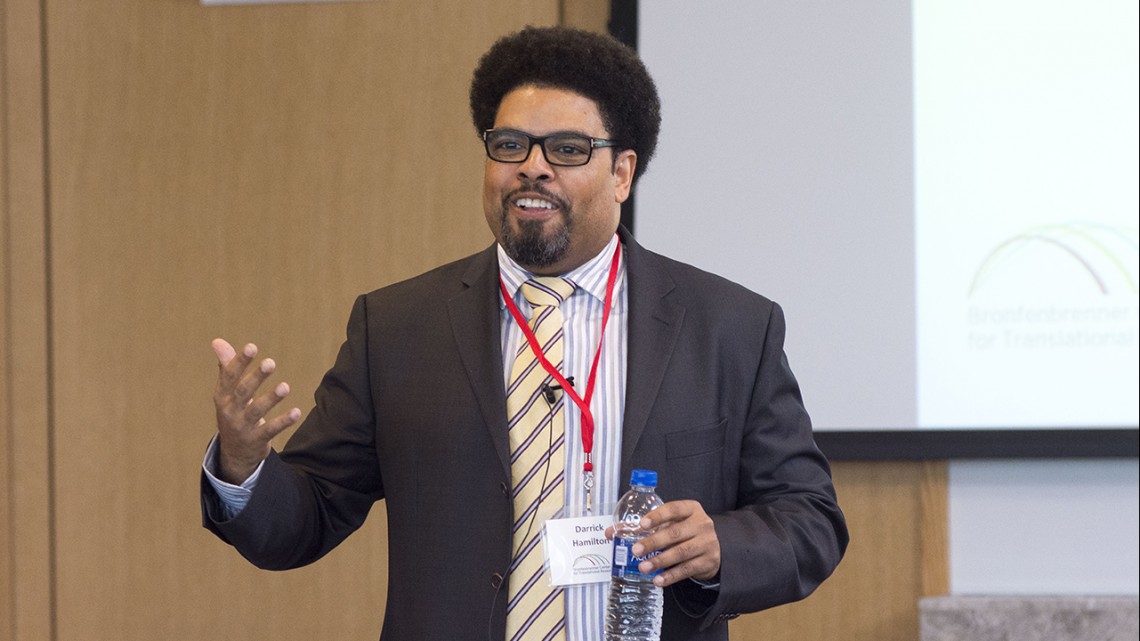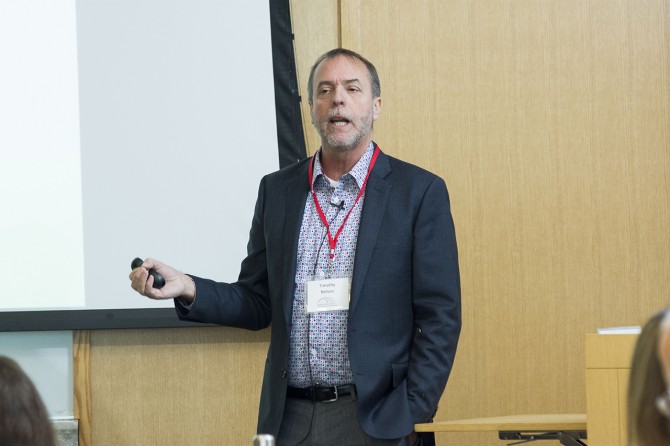
Darrick Hamilton, from The New School for Social Research, presents at the sixth biennial Urie Bronfenbrenner Conference.
Conference spotlights equality of opportunity for children
By Stephen D'Angelo
As inequality continues to grow in the United States and around the world, a national conference at Cornell Oct. 25-26 shined the spotlight on how to create equality of opportunity for children.
“An Equal Start: Policy and Practice to Promote Equality of Opportunity for Children” was the topic of the sixth biennial Urie Bronfenbrenner Conference, featuring a multidisciplinary mix of scholars from more than a dozen institutions and programs.
“We will be hearing some of the latest and most exciting research focused on policies and programs that enhance opportunities and promote equality for children,” said Rachel Dunifon, interim dean of the College of Human Ecology and conference co-organizer. “The papers presented here will certainly reflect Urie Bronfenbrenner’s ecological model of human development, which emphasized the multiple layers of influence that come together to support individual development.”
The conference convened a collection of leading researchers in an effort to cultivate interdisciplinary perspectives and consider micro-, meso- and macro-level interventions that best build opportunities for children to have an equal start in life.
The conference’s major topic areas included Innovations in Transfer Programs for Children, Making the Safety Net Work for Families, Education and Equality of Opportunity, and Multigenerational Influences of Child Development. Research centered on policy and practice in families, schools, neighborhoods, programs and policies; presentations were organized and structured to help move the field forward in terms of how scholars think holistically about promoting equality for children.
“We charged the presenters with answering the question: What does it take to equalize opportunity for children? We asked them to be bold, and they did not disappoint,” said Laura Tach, associate professor of policy analysis and management and conference co-organizer. “They showcased cutting-edge policies and programs, from behavioral ‘nudges’ to improve parenting to ‘baby trusts’ that reduce intergenerational wealth inequality. Collectively, they showed us how social science can inform policy and practice in ways that are both innovative and evidence-based.”
The conference series and the Bronfenbrenner Center for Translational Research (BCTR) are named for Urie Bronfenbrenner (1917-2005), the renowned developmental psychologist who taught at Cornell for more than 50 years and developed the ecological systems theory.
“This system, this ecological perspective from Bronfenbrenner, may give us another avenue to think about policies and practices that may improve children’s lives, and make a difference in some of their trajectories,” said Gary Evans, an environmental and developmental psychologist and the Elizabeth Lee Vincent Professor at the College of Human Ecology. “That, of course, is why all of us are here.”
BCTR takes the “bench to bedside” model of the medical sciences and applies it to the social sciences – training faculty and students in research-practice partnerships; carrying out applied, engaged research; and building research collaborations with policymakers and practitioners.
Papers from the conference will be published by the American Psychological Association.
Stephen D’Angelo is assistant director of communications at the College of Human Ecology.
Media Contact
Get Cornell news delivered right to your inbox.
Subscribe

